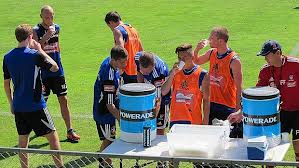By David Owen
October 7 – High-profile matches at next year’s World Cup tournament in Brazil may effectively be played over four periods rather than two, following FIFA’s endorsement of additional “cooling” breaks to protect the health of players.
While the prime focus of outside attention at last week’s gathering of the governing body’s top brass in Zurich was Qatar, FIFA’s ruling executive committee quietly decided to permit cooling breaks after the 30th minute of the first and second half of games if temperatures exceeded certain levels.
With a number of matches at the 2014 World Cup, including two quarter-finals, scheduled to kick off at 1pm, there seems every chance that such breaks will be implemented from time to time at FIFA’s flagship tournament.
As Michel d’Hooghe, chairman of FIFA’s medical committee, explained, the threshold at which cooling breaks will be triggered is when something called the Web Bulb Globe Temperature (WBGT) – a measure incorporating elements such as humidity and solar inclination as well as air temperature – exceeds 32 degrees.
D’Hooghe said that such breaks had already been used at the football tournament in the 2008 Beijing Olympic Games.
They might now be utilised in any FIFA competition.
The innovation is likely to be welcomed by commercial TV companies with rights to broadcast FIFA competitions, as well as players and coaching staff.
This is because the cooling periods will presumably provide an opportunity for additional commercial breaks at key moments when the outcome of matches is still in the balance and viewers are unlikely to switch off.
The fluid nature of football – in contrast to the stop-start rhythm of mainstream US team sports such as baseball and American football – is challenging for commercial broadcasters as there are long stretches in which they dare not break from the action to show advertisements for fear of missing a decisive moment.
D’Hooghe indicated that match officials would be given a certain amount of discretion to decide the exact juncture at which play would be halted in cases where the stipulated WBGT had been exceeded.

